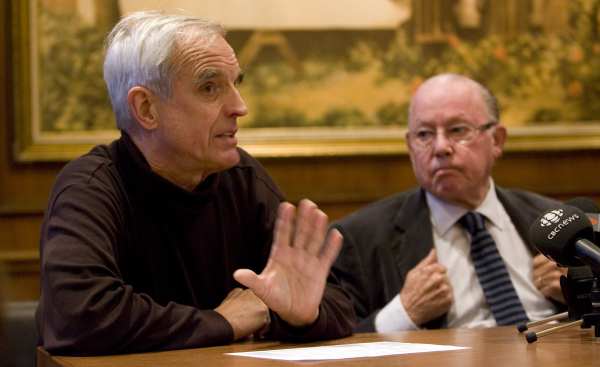QUEBEC — Anglophones are using the official bilingual status of municipalities to push for more English services — right down to insisting on the right to buy a bus ticket in their first language, the commission examining Bill 14 has heard.
In a six-page annex to a brief discreetly presented to the commission Wednesday, retired university professor Charles Castonguay — an anglophone from Gatineau — fires a scud missile at those defending bilingual status.
Bilingual status rules are “detrimental and perverted,” and inhibit the acceptance of French as the common language of Quebec, Castonguay writes in an annex titled, The Nonsense of Bilingual Towns.
“Misled by the triumph of Trudeauiste ideology, bilingual status has the effect of insisting on the use of English in all circumstances, including as elementary an act as buying a bus ticket,” Castonguay writes in the annex.
“And it’s whamo as far as French being the common language of public life.”
Castonguay’s views are bound to irritate Quebec mayors and anglophones who have appeared before the National Assembly commission looking into the bill to beef up the Charter of the French Language.
They argued bilingual status — which allows municipalities to communicate with citizens in French and English — is an acquired right.
The government should not be allowed to pass a bill giving itself the power to take it away — even in cities where the population of mother-tongue English speakers has slipped before the 50-per-cent mark, they argued.
But Castonguay, a retired University of Ottawa professor of mathematics and a specialist in language shifts, said Quebec has strayed from the original vision of the charter.
He said it included the bilingual status rules as a counterweight to the requirement that commercial signs be in French only.
Now that those rules have been struck down in favour of the “net predominance,” system, the situation now is “out of kilter,” Castonguay said.
“This status has now created the mentality among some anglophones of wanting English door-to-door, or wall to wall,” Castonguay said in an interview with The Gazette after his presentation to the commission.
“And that is not the spirit of Quebec’s language policy. We should get back to saying: ‘Anglos, we love you,’ but also please respect the French majority.
“French is objectively the language which is on the ropes in Quebec according to the Canadian census language data. Don’t pretend that you’re being martyrized or anything like that and don’t try and make the francophones feel rotten or something like that because they want to be able to speak French.”
He argued that a bus driver who insists on working in French only should be free to do so.
“Anglophones are using it to try and make all the francophones use English when they are in contact,” Castonguay said. “I think that’s a wrong behaviour. That’s not integrating Quebec society. That’s not fair play. Something is out of kilter.”
“Anglophones who have chosen to stay in Quebec or move to Quebec should think about language loyalty and the fact it is French which is in difficulty, not English.”
Castonguay appeared as a member of the hardline language group Syndicalistes progressistes pour un Québec libre (SPQ-libre) headed by Marc Laviolette, an active member of the Parti Québécois and riding association president.
Also present was SPQ-Libre’s secretary, Pierre Dubuc, who recently made waves when he said at a news conference about the bill: “If someone can’t ask for a métro ticket in French, let them walk.”
Castonguay, said the system has been perverted and has created “nests of anglicization,” in the West Island and in West Quebec.
In the 12 cities with bilingual status on the island of Montreal, 21 per cent of francophones stated in the 2011 census that English is their main language at home.
The francization of anglos in the same areas is one per cent. Among allophones, the rate of people transferring to English in these areas is 32 per cent and only seven per cent to French.
But SPQ-libre, which told the commission Bill 14 does not go far enough toward making French the common language of Quebec, had PQ minister Jean-François Lisée on its radar, too.
Lisée made waves when he urged the Société de transport de Montréal (STM) to follow the lead of the Agence métropolitaine de transport, which compels workers dealing with the public to be bilingual.
“STM, are you listening?” Lisée said.
His name comes up in the brief, which argues against the concept of predominance in the language debate. Bilingual signs, for example, are permitted now as long as French is predominant over English.
Polls show Quebecers widely accept such a compromise.
But the brief says it is an inferior formula compared to making French the common language in all areas of life.
“There’s a limit to wanting to accommodate and seduce,” the SPQ-Libre says.
The hearings continue Friday.
Bill 14 hearings: Bilingual status is detrimental, anglo argues



























Laissez un commentaire Votre adresse courriel ne sera pas publiée.
Veuillez vous connecter afin de laisser un commentaire.
Aucun commentaire trouvé